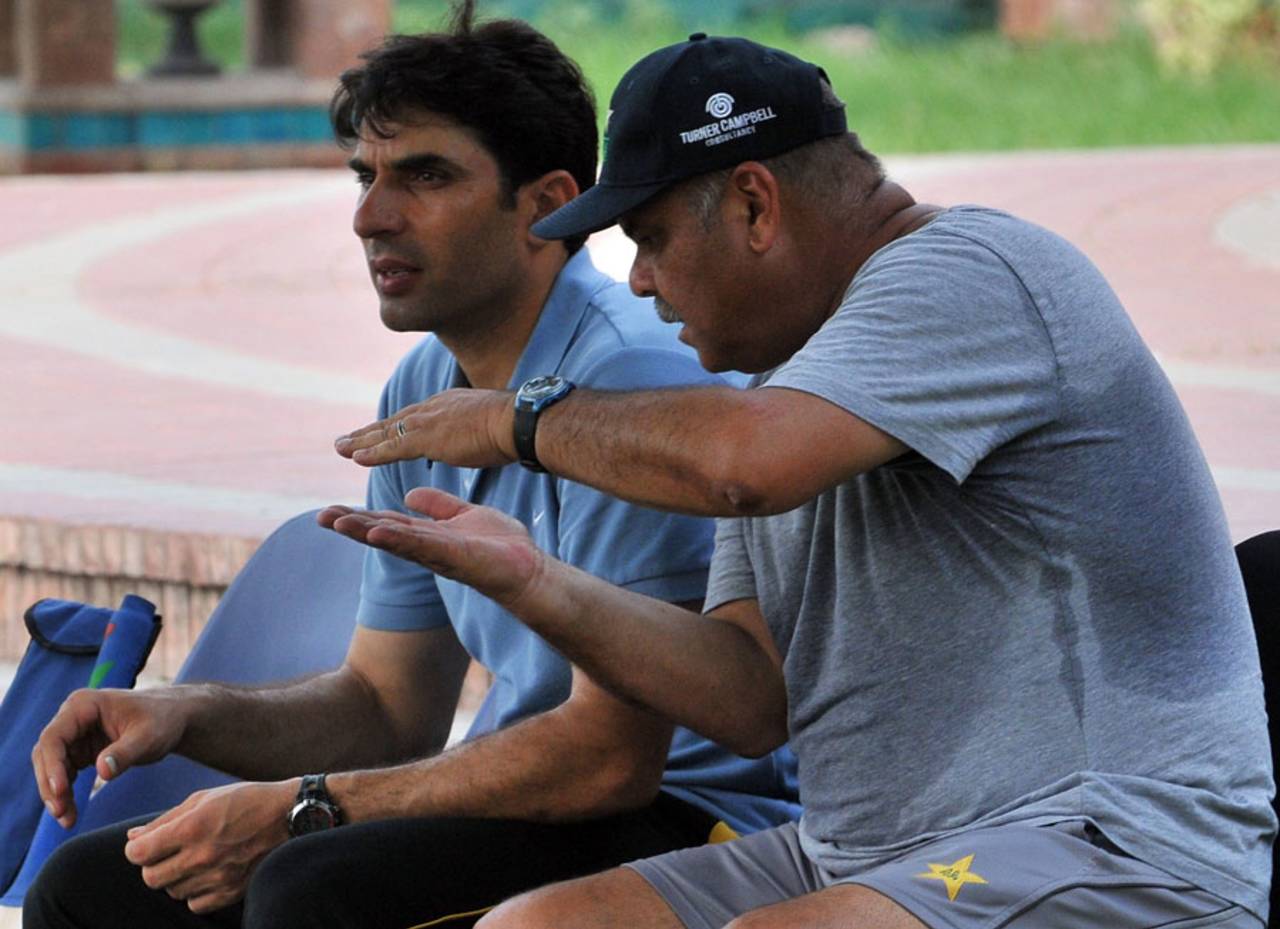Enough about Misbah already
Pakistan needs to look beyond the captain at the real problems that afflict the team
Ahmer Naqvi
Jul 21, 2013, 9:27 AM

Misbah: the focus of Pakistan's attention • AFP
One January morning in Lahore, a well-groomed young man, having walked up Davis Road to the Mall, turned to Charing Cross. His hair was sleek and shining and he wore sideburns. His thin moustache seemed to have been drawn with a pencil. He had on a brown overcoat with a cream coloured half opened rose in his buttonhole and a green felt hat which he wore at a rakish angle. A white silk scarf was knotted at his neck. One of his hands was slipped into a pocket of his overcoat while the other held a short polished cane which every now and then he twirled jauntily. (Excerpt from Ghulam Abbas' short story "Overcoat", translated by CZ Abbas)
One of Pakistan's greatest writers started his most popular story with these lines. I was reminded of his work earlier this week, while watching Pakistan's tour of the West Indies. Those of you who have been following this series are well aware that it is the largest televised event of competitive mediocrity since Simon Cowell's last show.
The question that came to mind while watching Pakistan bat in the first two matches had to do, inevitably, with the captain, Misbah-ul-Haq.
Misbah has spent almost all of the last year (and indeed his captaincy) coming in to bat within the first Powerplay; all three openers dismissed, and the score lower than a news channel's sense of ethics. He has then proceeded to play at a very slow pace, and sought to consume deliveries while minimising the risk of further losses.
The question therefore was whether this is the only way Misbah can bat, or if he has had no other option but to bat in such a manner.
For his fanatical followers, battling in a reactive, defensive style is the only recourse available to him because of the situations he faces. They argue that without Misbah's constant rearguard heroics, the team would keep breaking the record for the lowest conceivable total. They further point out that he has shown his ability in domestic tournaments (and earlier in his career) to play the big shots, and that it's the cruelty of circumstances that prevent him from bringing out this aspect of his batting in the international game.
For the multitude of Misbah's detractors, however, the glass is half-empty, poisoned, or perhaps even a figment of the imagination. They claim that Misbah doesn't know to bat any other way, and if he did, he has long forgotten it. They claim that his approach has suffused the team so deeply that erstwhile go-getters like Nasir Jamshed have also tamed their strike rates. And most importantly, they hold Misbah's approach to be the reason for Pakistan's miserable failures of late, arguing that not only is his style killing all flair, but that his approach means that any batsmen coming after him have too much on their hands to try to increase the run rate and don't deliver a competitive score.
It was during the middle of one such debate that I first thought of "Overcoat". At the story's conclusion, Abbas' protagonist is involved in a car accident. When he is taken to the hospital and his clothes are removed, we see the truth revealed about him.
Beneath the scarf, there was neither a tie nor a collar ... not even a shirt. When the overcoat was removed, it was found that the young man was only wearing an old cotton shirt, full of holes. Through these holes, one could see the dirty vest in an even worse shape than the shirt. The young man had wrapped the silk scarf in such a way that it concealed most of his neck and chest. Layers of dirt covered his body. He could not have had a bath for at least two months. Only the upper part of his neck was clean and scented.
The young man had been a pauper who had meticulously crafted his outward, debonair appearance to cover up his impoverished reality. And this is where #TeamMisbah comes in.
The debate in Pakistan so far is between one set of people that believes Misbah is the only person holding this terrible team together, versus another set that feels Misbah is the reason the team is so terrible. In essence, Misbah is either the lovely, fragrant overcoat or the tattered, sullied body underneath it.
Unfortunately, such a view obfuscates the larger, necessary debate. When we finish reading "Overcoat", we do not feel contempt for the protagonist, because his deception was not malicious. The contempt we feel is towards our own obsession with appearances, and how debilitating that can be.
We need to look beyond either crucifying or beatifying Misbah, and think about the reasons that have caused our team, and particularly its batting, to regress so alarmingly. We need to discuss issues of governance in our board, failures in our coaching and management, the sickening approach to selection, and the abdication of responsibility by the ICC and other boards. We need to talk about structural solutions, long-term plans for players and coaches, templates and institutions for guaranteeing success. To debate one player above all else is to be precisely the sort of short-sighted judgemental fools that Abbas exposed so masterfully.
For the good of Pakistan cricket, it's about time we looked beyond our overcoats.
Ahmer Naqvi is a journalist, writer and teacher. He writes on cricket for various publications, and co-hosts the online cricket show Pace is Pace Yaar. He tweets here